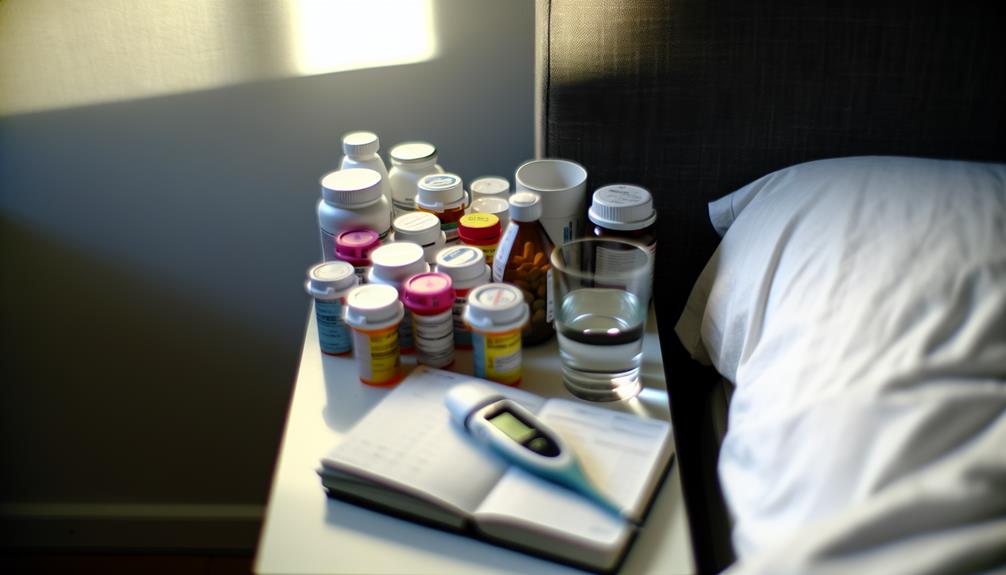Male hormone imbalance can stem from several factors. I've found that poor diet choices, including nutrient deficiencies, play a significant role. Lack of physical activity leads to lower testosterone levels, while chronic stress elevates cortisol, disrupting hormonal balance. Sleep disorders can further exacerbate these issues. Additionally, certain medical conditions like obesity and diabetes affect hormone levels. Aging naturally reduces hormone production, and exposure to environmental toxins can disrupt endocrine function. Substance abuse and hormonal medications also contribute to imbalances. Understanding these causes is vital for maintaining hormonal health, so let's explore further insights on addressing these imbalances.
Poor Diet Choices

Making poor diet choices can greatly impact male hormone levels, leading to imbalances that affect overall health and well-being. I've observed that many men overlook the significance of a balanced diet in maintaining hormonal equilibrium. Nutrient deficiencies, particularly in vitamins and minerals like zinc, vitamin D, and omega-3 fatty acids, can disrupt the endocrine system, which plays a vital role in hormone production. For instance, inadequate zinc levels are often linked to reduced testosterone, while low vitamin D may impair overall hormonal function.
Moreover, poor dietary habits can contribute to metabolic syndrome, a cluster of conditions that increase the risk of heart disease, stroke, and type 2 diabetes. This syndrome is characterized by obesity, insulin resistance, and elevated blood pressure, all of which can further exacerbate hormonal imbalances. When insulin levels rise due to poor dietary choices, testosterone levels can decline, creating a vicious cycle that negatively impacts metabolism and overall health.
I can't stress enough how important it is to adopt a nutrient-rich diet filled with whole foods, lean proteins, healthy fats, and a variety of fruits and vegetables. By doing so, not only can we combat nutrient deficiencies, but we can also mitigate the risk of developing metabolic syndrome. It's essential to recognize the connection between what we eat and how it influences our hormonal health, empowering us to make informed dietary choices that support our well-being.
Lack of Physical Activity
In addition to poor diet choices, a lack of physical activity plays a vital role in disrupting male hormone balance. I've observed that many men today are leading a sedentary lifestyle, often spending prolonged hours sitting at desks or engaging in passive activities. This inactivity can lead to a host of hormonal issues, primarily by reducing testosterone levels. When I consider the physiological impact of exercise, it's clear that regular physical activity acts as a powerful stimulus for hormone production and regulation.
Engaging in exercise boosts testosterone levels, enhances insulin sensitivity, and promotes overall metabolic health. I've found that both aerobic and resistance training yield impressive exercise benefits, contributing to improved hormone profiles. For instance, strength training not only helps in building muscle mass but also increases testosterone production, countering the adverse effects of a sedentary lifestyle.
Furthermore, physical activity can mitigate the risk of obesity, which is closely linked to hormonal disruptions. Excess body fat, particularly around the abdomen, produces estrogen, further complicating the male hormonal balance. As a result, integrating regular exercise into daily routines isn't just about physical fitness; it's an essential strategy for maintaining healthy testosterone levels and overall hormonal harmony.
To summarize, embracing an active lifestyle can greatly counteract the negative effects of inactivity on male hormone balance. By prioritizing exercise, we can leverage its numerous benefits to foster better hormonal health and improve quality of life.
Chronic Stress

Chronic stress triggers the release of stress hormones like cortisol, which can greatly disrupt the balance of testosterone in males. I've observed that elevated cortisol levels not only inhibit testosterone production but can also lead to a range of health issues. Understanding this relationship is essential for addressing the underlying causes of hormone imbalance.
Stress Hormones Explained
When we experience prolonged periods of stress, our bodies react by releasing a complex mix of stress hormones, primarily cortisol and adrenaline. These hormones play an essential role in our stress responses, preparing us to respond to perceived threats. However, chronic stress leads to sustained high cortisol levels, which can disrupt the delicate hormonal feedback mechanisms in our endocrine system. Over time, this can result in adrenal fatigue, where the adrenal glands become less effective at producing these hormones.
The implications of hormonal imbalances extend beyond physical health; they markedly impact mental health as well. Elevated cortisol levels can contribute to anxiety, depression, and mood swings, exacerbating the challenges of coping with stress. Lifestyle factors, such as poor diet, lack of exercise, and inadequate sleep, can further worsen these hormonal imbalances.
To mitigate these effects, developing effective coping mechanisms is essential. Techniques such as mindfulness, regular physical activity, and balanced nutrition can help regulate cortisol levels and restore hormonal balance. Understanding the interplay between stress hormones and our overall well-being empowers us to take proactive steps toward better health.
Impact on Testosterone Levels
Prolonged exposure to stress can markedly affect testosterone levels in men. When we're under chronic stress, our bodies produce elevated levels of cortisol, a stress hormone that directly interferes with testosterone production. This disruption in hormone regulation can lead to a cascade of negative health effects, including decreased libido, fatigue, and even mood disorders.
In my observations, the relationship between stress and testosterone is quite complex. Elevated cortisol levels not only inhibit the Leydig cells in the testes, responsible for testosterone synthesis, but they also impact the hypothalamic-pituitary-gonadal (HPG) axis, which plays a significant role in hormone balance. When cortisol is high, the body's focus shifts towards managing stress, often at the expense of reproductive hormone production.
It's important to recognize that this imbalance can create a vicious cycle. Lower testosterone levels can lead to increased feelings of stress, perpetuating a decline in overall well-being and further hormone disruption. Consequently, managing stress through mindfulness, exercise, or therapy can be essential for restoring testosterone levels and overall hormonal health. Understanding this connection is imperative for anyone looking to maintain peak testosterone levels in the face of life's challenges.
Sleep Disorders
Sleep disorders can often be a subtle yet vital indicator of male hormone imbalance, as disruptions in hormonal levels may lead to various sleep-related issues. I've noticed that my sleep quality can be heavily affected by hormonal fluctuations, particularly with testosterone and cortisol. When these hormones are out of balance, it can manifest in insomnia, sleep apnea, or excessive daytime sleepiness, which further complicates daily functioning.
To better illustrate the relationship between sleep disorders and hormone imbalance, consider the following table:
| Sleep Disorder | Hormonal Influence | Effects on Sleep Quality |
|---|---|---|
| Insomnia | Low testosterone | Difficulty falling/staying asleep |
| Sleep Apnea | High cortisol | Frequent awakenings, poor rest |
| Excessive Daytime Sleepiness | Hormonal fluctuations | Impaired alertness, fatigue |
These disruptions can create a vicious cycle; poor sleep can lead to further hormonal imbalance, which in turn exacerbates sleep issues. Recognizing these patterns is essential; if you find yourself grappling with sleep disorders, it's worth considering whether your hormonal levels might be contributing to your struggles. Addressing the root causes, such as lifestyle changes or seeking medical advice, can greatly improve both sleep quality and overall well-being. By understanding this connection, we can take proactive steps to restore balance in our lives.
Medical Conditions

Hormonal imbalance in men can often be linked to various medical conditions that notably impact overall health. As I've explored this topic, I've discovered that certain disorders can lead to considerable endocrine disruption, affecting testosterone levels and overall hormonal harmony. Understanding these conditions is vital for anyone looking to address imbalances through methods such as testosterone therapy.
Here are three significant medical conditions that can cause hormonal imbalance:
- Hypogonadism: This condition results in the body producing insufficient testosterone, leading to symptoms like fatigue, reduced libido, and muscle mass loss. It can stem from various causes, including genetic factors or damage to the testicles.
- Obesity: Excess body fat can lead to a condition known as aromatization, where testosterone is converted into estrogen. This not only reduces testosterone levels but can also contribute to a cycle of further weight gain and hormonal imbalance.
- Diabetes: Both type 1 and type 2 diabetes can considerably impact hormone levels. Insulin resistance often leads to lower testosterone levels, presenting a dual challenge for men already grappling with these medical issues.
Addressing these conditions may require a multifaceted approach, including lifestyle changes and, in some cases, testosterone therapy. It's essential to consult a healthcare professional for accurate diagnosis and tailored treatment plans. Awareness of these medical conditions can empower men to take proactive steps toward restoring hormonal balance.
Aging Process
As men age, it's common for hormone levels, particularly testosterone, to decline considerably. This reduction can lead to various health issues, including diminished energy, mood changes, and reduced muscle mass. Understanding the implications of this decline is essential for managing overall well-being as we navigate the aging process.
Hormone Levels Decline
With the passage of time, our bodies undergo a natural decline in hormone levels, which can greatly impact overall health. This decline isn't just about feeling older; it involves complex interactions between various factors. As I navigate through this process, I've noticed three significant elements that contribute to hormonal imbalances:
- Dietary Supplements: I often consider how nutrient deficiencies can affect my hormonal health. Supplements can help, but it's essential to choose wisely.
- Lifestyle Changes: Adopting healthier habits is essential. Regular exercise and balanced nutrition can mitigate the effects of hormonal decline, improving my gut health and weight management.
- Hormonal Therapy: For some, seeking hormonal therapy can be a viable option. However, it's important to weigh the benefits against potential risks, considering genetic factors and personal health history.
Additionally, I recognize that endocrine disruptors in our environment can further complicate hormonal health, influencing mental health and reproductive health. As I reflect on my journey, I understand that addressing these issues through informed choices is crucial in maintaining a balanced hormonal profile as I age.
Effects on Health
The decline in hormone levels can lead to a range of health effects that become more pronounced with age. As I've observed, issues like reduced energy, weight gain, and diminished mental health can arise. It's essential to understand how these hormonal changes impact overall well-being.
| Health Effect | Description | Possible Solutions |
|---|---|---|
| Reduced Energy Levels | Men often experience fatigue and lethargy. | Regular exercise, dietary supplements |
| Weight Gain | Hormonal imbalance can lead to increased fat accumulation. | Balanced diet, lifestyle changes |
| Mental Health Issues | Mood swings, depression, and anxiety may intensify. | Therapy, support groups, dietary supplements |
Dietary supplements can play a significant role in mitigating these effects. For instance, supplements like Vitamin D and zinc have been linked to improved hormonal balance. Additionally, addressing mental health is important; engaging in therapy or support groups can help manage the psychological ramifications of hormonal decline. Understanding these interconnected effects can empower you to take proactive steps in maintaining your health as you age.
Environmental Toxins

Hormonal stability is profoundly impacted by environmental toxins, which can disrupt the delicate balance of male hormones. I've learned that various substances we encounter daily can act as endocrine disruptors, leading to significant health issues. This disruption can arise from a range of sources, including industrial pollutants and chemical exposure in our environment.
Here are three key categories of environmental toxins that can influence male hormone levels:
- Heavy Metals: Found in contaminated water, soil, and even some foods, heavy metals like lead and mercury can accumulate in the body, adversely affecting hormonal function over time.
- Plastic Additives: Chemicals like bisphenol A (BPA) are commonly found in plastics. These additives can leach into food and beverages, mimicking hormones and leading to imbalances in testosterone levels.
- Agricultural Chemicals: Pesticides and herbicides used in farming can enter our food supply and water systems. When we consume these agricultural chemicals, they can disrupt our endocrine system and negatively affect hormone production.
Other contributors include household cleaners and personal care products, which often contain harmful chemicals that can affect air quality and accumulate in our bodies. Wildlife contamination also poses risks, as toxins can enter the food chain, ultimately impacting human health. By understanding these environmental toxins, we can take steps to mitigate their effects and aim for better hormonal balance.
Substance Abuse
Substance abuse can lead to profound hormonal imbalances that greatly impact male health. As I've explored the effects of various substances, I've noticed that addiction often disrupts the delicate balance of hormones like testosterone and cortisol. When men engage in substance use, whether it's alcohol, opioids, or stimulants, their endocrine systems can become notably affected. For instance, alcohol consumption has been shown to lower testosterone levels, which can result in reduced libido, infertility, and even mood disorders.
Moreover, chronic substance use can lead to increased levels of stress hormones, such as cortisol, which can further exacerbate hormonal imbalances. This is particularly concerning because elevated cortisol can cause a cascade of health issues, including weight gain and decreased energy levels. I've found that these hormonal fluctuations not only affect physical health but can also negatively influence mental well-being, creating a vicious cycle that can be hard to break.
In many cases, those struggling with addiction may not realize how their substance abuse is impacting their hormonal health. During addiction recovery, addressing these imbalances becomes essential. As individuals work towards sobriety, they should also consider consulting healthcare professionals who can assist in monitoring and managing hormonal levels. Through a thorough approach that includes both addiction recovery and hormonal health, men can reclaim their well-being and restore balance to their lives.
Hormonal Medications

Addiction's toll on hormonal health often prompts men to seek solutions through hormonal medications. Hormone therapy can be a double-edged sword; while it addresses imbalances, it also comes with a range of medication side effects that can complicate the treatment process. I've learned that understanding these medications is essential for anyone considering this path.
Here are three key considerations when contemplating hormone therapy:
- Type of Hormonal Medication: Different medications target various hormonal issues. For instance, testosterone replacement therapy can help men with low testosterone levels, but it's important to consult a healthcare professional to determine the right approach.
- Potential Side Effects: While hormone therapy can yield positive results, it's important to be aware of the possible side effects. These can include mood swings, weight gain, and increased risk of cardiovascular issues. Recognizing these risks helps in making informed decisions.
- Monitoring and Adjustment: Regular follow-ups with your healthcare provider are necessary to monitor hormone levels and adjust dosages. This ongoing assessment guarantees that you're getting the benefits of the medication while minimizing adverse effects.
Frequently Asked Questions
How Do Genetics Influence Male Hormone Levels?
I know it might seem like genetics is just a predetermined fate, but it's actually a fascinating interplay. My genetic predisposition plays an essential role in hormonal regulation, influencing how my body produces and balances hormones. Variations in specific genes can affect testosterone levels and other hormones, shaping not just physical attributes but also mood and energy. Understanding this helps me appreciate the complexity of my own hormonal landscape and its genetic foundations.
Can Hormone Imbalances Affect Mental Health?
Absolutely, hormone imbalances can greatly affect mental health. I've seen how fluctuations in hormone levels can lead to mood swings and increased stress factors. When hormones like testosterone are off-balance, it can trigger anxiety or depressive symptoms, impacting overall well-being. Understanding this link is essential, as addressing hormonal issues may help stabilize mood and reduce stress, ultimately leading to better mental health outcomes. It's a complex relationship worth exploring further.
What Role Does Hydration Play in Hormone Balance?
Hydration plays a vital role in hormone balance, and I've noticed its impact firsthand. Adequate water intake is essential for the proper functioning of glands that produce hormones. When I'm dehydrated, I often feel more fatigued and irritable, which can affect my overall well-being. It's fascinating how hydration impact extends beyond just physical health—staying hydrated helps maintain ideal hormone levels, influencing mood and energy throughout the day.
Are There Specific Foods That Boost Male Hormones?
Imagine your body as a finely tuned engine, where testosterone boosting foods serve as premium fuel. I've found that incorporating healthy fats like avocados and nuts can markedly enhance testosterone levels. These foods provide the building blocks for hormone production, helping to maintain balance. Additionally, lean proteins and cruciferous vegetables play essential roles too. By making these dietary choices, I've noticed a positive shift in my overall vitality and well-being.
How Can I Naturally Test My Hormone Levels at Home?
If you're looking to naturally test your hormone levels at home, I've found that using hormone kits is a great option. These kits often require saliva samples, which can be more convenient than blood tests. You'll want to evaluate various lifestyle factors, like diet and exercise, as they can impact your results. By tracking these elements alongside your hormone levels, you can gain valuable insights into your hormonal health.
